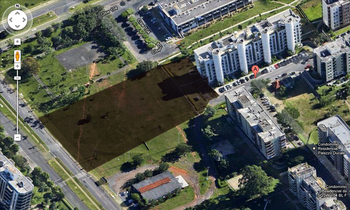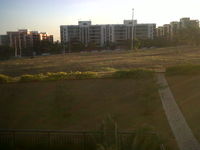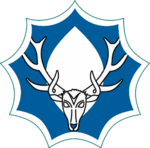1st Grand Duchy of Koss
| Motto: "Ex nihilo ascendemus" | |||||||||
 The Kossian Districts of Bravia, Federal District and Nilza | |||||||||
| Capital | Domino | ||||||||
| Largest city | Bravia City | ||||||||
| Official languages | Portuguese, English,Galician | ||||||||
| Demonym(s) | Kossian | ||||||||
| Government | Reformed Monarchy | ||||||||
| Lucas Campos | |||||||||
| Leon Frajmund | |||||||||
| Legislature | Royal Council | ||||||||
| Establishment | June,15th as RPS | ||||||||
| Population | |||||||||
• Census | 6 | ||||||||
| Currency | Kossian franc& Austral franc | ||||||||
| Time zone | KST | ||||||||
Website www | |||||||||
| |||||||||
Koss, officially the Grand Duchy of Koss was a micronation, located in the Federative Republic of Brazil. It was a founding member of the Austral Economical Union, a former full member of the Grand Unified Micronational and one of the founders of the League of Capitalists. It was part of a nation project conducted by Lucas Campos since its birth on 2010 as the Republic of Smint. It was disestablished after the merger with Montriac to create the Realm of Koss.
History
Republic of Smint
On June 15, 2010, Lucas Campos, under the name of Keko Smint, founded the Republic of Smint. The Republic claimed land in Antartica and it was involved in a conflict with the ASEA. The micronation later grew to be inactive.
First Kossian Republic
After the unsuccessful try to establish a micronation on 2010, Campos left the community, coming back on April 25 of 2011 with the First Kossian Republic under his command as President. After a reform, approved by the Council of Ministers, on April 27, President Lucas Campos resigned in favor of Isabela Mello, who was made the new President by the Kossian legislature, becoming one of the leaders of the Republic. Being the other one, the Prime Minister, Lucas Soares. Isabela Mello appointed Lucas Campos as the Secretary of State of the Republic of Koss. On the beginning of June it was announced that the Nemkhav Federation would be accepting new states. Negotiations between the Kossian Secretary of State, Lucas Campos and the Nemkhav President, Mark Meehan soon began. On June 5 the Republic of Koss became part of Nemkhavia being the first state to ever join the Federation.
Nemkhav Republic Koss
On June 3 the Secretary of State of the Republic of Koss, Lucas Campos, began negotiations with Nemkhav Federation's President Marka Mejakhansk. On June 5 the First Kossian Republic was dissolved and it was established the Republic of Koss as a territory of Nemkhavia. During, what is called by the President: "Nemkhav Koss", many changes happened, such as:
- The disclaim of the Navassa Island
- Change of flags
- Creation of a Coat of Arms
The Republic lived for seven months before it was dissolved, replaced by the Kossian Provisional Government
Kossian Provisional Government
Seven months after joining the Nemkhav Federation as a Republic, the President, Lucas Campos, notice the sudden need for an change in the form of government, as a way to increase internal activity. On November the 7th, the President, Lucas Campos, passed the Kossian Act, which determined: the disestablishment of the Republic of Koss, the establishment of the Kossian Provisional Government until the Monarchy was installed.
Grand Duchy of Koss in Nemkhavia
After seven days of planning and preparing, Lucas Campos, established the Grand Duchy of Koss, nominating himself as Grand Duke. The monarchy has been an success so far, the internal activity has increased in an outstanding way. The Grand Duchy was ruled by the Grand Duke, at the time Lucas Campos, with the help of the Royal Council as an advisory body. Since the Kingdom of Pristinia left the Federation, due to a major internal dispute, the Grand Duke began to think if Nemkhavia was really the best thing for Koss. After discussing the proposal with some experienced micronationalists, Campos decided to secede from the Nemkhav Federation.
Grand Duchy of Koss
On January 15, 2012, Koss declared independence from the Nemkhav Federation. Since the secession, the Grand Duchy has prospered as a nation throughout the community. The Monarchy is responsible for the creation of the Austral Economical Union along the Principality of Montriac
The Empire
Koss and Montriac had every time closer diplomacy, talks and relations. The two nations where the most active micronations in the South American region, and they were getting to a point of conclusion. The idea of a merge between the two royalist states was very soon to appear, but the governments of the two nations took it well. The original pointed date for the union was March 1, but it was moved to March 2nd thanks to the benefits of having the future Emperor, Lucas Campos, in its home state; after a tour over France and Germany.
The Great Depression of Montriac
On March 2012 the Montresque community witness its first great depression, called depeçi da lit. The population, thanks to the taxes imposed by the government, was slowly losing interest in the micronational project and even leaving Montriac. This also caused a rupture in the economy that led not only to the drain of the Montresque reserve but also an external debt, a 10% of the last recorded amount of money saved in the reserve. The government in base of the Archduke's advice, convinced a small part of the population to stay in the Archduchy, knocking down the tax affair. The population descended a 66.6% of its size. After this, the government was broken, many governmental officers had left and the interest of the citizens for the Montresque politics was almost nonexistent; and because of this, the Prime Minister decided to order an absolute monarchy under Lucas I until a new better government system can be applied, and the interest of the citizens is recovered.
Republic VS Archduchy
On the 12 of March 2012, after several disputes between the central government of Koss, the Emperor and the Montrésque delegation led by Tarek Kârjasary as the main messenger of the Montrésque community; the Imperial executive reached to a decision, freeing Montriac. But this was under strict conditions described in a letter sent by the Kossian Emperor to the Montrésque delegation, which were described as follows:
*"Montriac will not be considered the successor of the Kossian Empire"
- "The UNECAUS, Montriac will continue to be a member, but the structure of the Union will change: The Kossian Empire or its successor will be the leader and will make the ultimate decisions."
- "To engage in any form diplomatic relations between the Realm of Koss and Montriac, the Monarch of Koss must give approval, which he mostly like won't."
- "The new independent Montriac will not have myself as a leader, and shall adopt the Monarchy as their government system and it must keep the Order of Lucas I in tribute to me. On April 1st the Montresque community can change its form of government to whatever it likes and it can choose to destroy the order or not."
The terms of the letter were heavily criticized by the Premier., who refused to accept the stipulated conditions and decided to seek for external support. After a rapidly but violently conflict between the two parties, the Montresque President Isadora Annenak agreed the conditions stipulated by the Kossian Emperor Lucas I in the Montriac letter[1] sealing the "crisis".
Jaankecil and its Rebellion
With the sudden leave of Montriac, many began to inquiry as to whether the Empire would be dismantled. Even after the release of an article in the Kossian Gazette,[2] the future of the Empire was uncertain, the People and the Royal Council were fearing for the end of the Realm. On March 28, the Principality of Jaankecil joined the Empire, extinguinshing any doubts about the continuity of the Monarchy. A week after the Principality was accepted in the Realm, the Prime Minister of Jaankecil, Yury Zozulya informed the central government about a rebellion that was happening in the princedom. The Prime Minister informed that the lack of support by the population for a non-communist state was huge, soon, Leader of the opposition, Syam, entered in contact with the Kossian Emperor and explained that Jaankecil would be either conquered by force or by the Koss ceding the land, after talks between the Monarch and the Prime Minister, it was decided that Jaankecil would be a free country once again.
The end of a Realm
An article[3] published in the Kossian Gazette authored by the Grand Duke of Koss was released on April 12, explaining what would happen now that Jaankecil was gone. It was decided by the Estates of the Realm that the Empire should be dismantled, the 2nd Grand Duchy of Koss would take its place as the only successor on April 18.
Politics
Koss was a reformed monarchy headed by the Grand Duke. The Government structure was divided the 3 powers(Legislature, Executive and Judiciary) between the nobility of the Grand Duchy.
- Council Minister of the Royal Council(Legislature):Isabella Mello
- Judge of the Supreme Court (Judiciary):Vacant
- Grand Duke of Koss (Executive):Lucas Campos
- Royal Chancellor of Koss (Executive):Luiza Portes
Legislative power was vested in the Royal Council, an unicameral legislature of three members, who were directly appointed by His Royal Highness Lucas Campos. The Royal Council was for the purpose to advice and to limit the powers of the Grand Duke. The leader of the Royal Council was called Council Minister,the last Council Minister was the Princess of Koss, Isabella Mello.
For the Judiciary power, The Grand Duchy had three lower tribunals, located in the District of Bravia, District of Renu and in the District of Rio Brilhante. There was also the Supreme Court of Justice, which interpretated the law at a federal level. The Supreme Court of Justice was lead by Leon Frajmund until the de facto disestablishment of it, it was located in Pontava City
The Executive branch of Koss, was vested by the Royal Chancellor and the Grand Duke, jointly. The Chancellor, lastly Lady Luiza Portes, took care of leading the state administration (a kind of a "Home Office" but often with foreign political duties).
Koss retained a major significant power inside the Empire considering that the Emperor's home state is Koss, and the Imperial Capital is located in the Grand Duchy.
Administrative divisions

Koss is divided into districts, marquessates, duchies, baronies and countships which are further divided into cities and municipalities.
The districts are
- Barony of Bravia
- District of Renu
- Federal District
- District of Rio Brilhante
- Duchy of Nilza
- Marquessate of Pontava
- Countship of Hortus
- District of Zoric
Economy
The economy of Koss is mainly based in the annual taxes imposed by the Kossian government, but the government has started to engage in other economic activities in order to develop an independent state economy . The official currency of Koss is the Austral franc, as established by the Austral Economical Union.
The Austral franc is pegged to one macronational currencies, the Euro. It is currently pegged at 0.60 to the franc
The Royale, an intermicronational bank and the official one of the UNECAUS is responsible for printing the Austral franc throughout the nation and other member-states of the Union.
Military

Military power is vested by the Kossian Defence Forces, it is headed by the Royal Chancellor. When the Grand Duchy was a state of the Nemkhav Federation, the Federation adopted the Policy of Peaceful Existence also known as Mejakhanskism which prohibited Koss and other states of Nemkhavia to engage any type of military conflict. The Grand Duchy declared independence from the Federation on January 15, 2012, it did not adopt Mejakhanskism, but it hasn't engage in any war and does not plan to engage in one, always seeking for a diplomatic solution.
Language
Thee languages are recognised as official in Koss: English, Galician and Portuguese, although French is widely spoken in the Grand Duchy.
On November 27, 2011, the District of Renu asked the Supreme Court to remove the English Language as one of the official language in the district and implant the French Language as one of the official language in the district. On November 29, 2011, the 1st Supreme Judge Lord Lucas Soares, carried the request to the Royal Council, which on December 1, 2011, approved the change.
Each of the three languages is used as the primary language in certain spheres. Portuguese is the language that Kossians generally use to speak to each other. Government Papers have to be written in both English and Portuguese. On February 17, the Grand Duke officialized the galician language, with the hope the government, until June, to be working solely based on galician.
See also
- Republic of Koss
- Republic of Koss in Nemkhavia
- Nemkhav Federation
- Kossian Provisional Government
- Coat of arms of Koss
- Republic of Smint
Available languages for this page:
• English |

